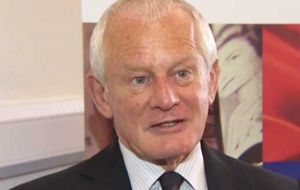MercoPress. South Atlantic News Agency
Isle of Man hits back at G8 over tax evasion and questions secrecy of UK and US banks
 Isle of Man's Chief Minister Allan Bell questioned the US administration double standard
Isle of Man's Chief Minister Allan Bell questioned the US administration double standard The Isle of Man and Jersey have hit back at accusations that they facilitate tax evasion and avoidance ahead of next week's G8 summit. The offshore jurisdictions, frequently described as tax havens, suggest recent pressure from world leaders is politically motivated.
They also argue that they are more open about their tax regimes than they are given credit for. G8 leaders will hold their latest summit in Northern Ireland on Monday.
Ways of combating aggressive tax avoidance and mass tax evasion are expected to be high on the agenda of leaders including UK Prime Minister David Cameron, US President Barack Obama and Germany's Chancellor Angela Merkel.
Up to now the focus of the world's media has been on big countries pointing their fingers at small islands - accusing them of helping big corporations and wealthy individuals avoid paying tax.
But now the leaders of some of those offshore financial centres suggest that the world's largest economies should get their own tax house in order first.
“Politicians love scapegoats,” said the Isle of Man's Chief Minister Allan Bell. “And the G8 agenda is being politically driven because there's always someone else to point a finger at.”
There is no universally accepted definition of a tax haven, but international bodies cite low tax rates and secretive financial systems as the major characteristics.
Foreign-owned companies pay no corporation tax in the Isle of Man, but the island has recently signed tax information sharing agreements with the UK, US and European countries.
Mr Bell said that when it comes to tracing who actually owns some of the world's more secretive bank accounts, the Isle of Man is a decade ahead of other larger countries especially the UK and the US.
He also accused President Obama of double standards, given that the US federal government has no direct control over the tax policies of individual states.
That is especially relevant when it comes to the tiny US state of Delaware which has only 900,000 citizens but over a million registered companies - most of which are “brass plate” entities controlled by very private entities or individuals.
“We just want a level playing field when it comes to tax transparency,” said Mr Bell.
“It's totally selfish from the USA because they want to track down their own tax evaders overseas, without looking at Delaware.”
The channel island of Jersey also charges zero corporation tax for foreign-owned companies.
Like the Isle of Man it also has a maximum income tax rate of 20%. At any one time it is home to £120bn of cash deposits.
But Jersey's Treasury Minister, Philip Ozouf, rejected the notion that his government is any softer on tax issues than countries like the UK.
He cited the case in the UK where wealthy individuals with “non-dom” status can pay a one-off levy of £30,000 a year to avoid being taxed on their income.
“I'm not going criticise the decision of democratically elected governments or parliaments,” he said.
“I'm leading the kind of charge against tax evasion here that the UK chancellor is doing to UK residents. We expect our taxpayers to comply with all tax codes just as much as the UK does.”
The foreign super-rich can move to Jersey thanks to a tax benefit that requires the payment of a flat rate of up to £118,000 a year. However some millionaires pay only 5.000 dollars a year thanks to deals signed in the 1970s and 1980s.
While their low tax rates are obvious, both the Isle of Man and Jersey claim to be far more open about who holds money on their islands than any of the G8 countries which are demanding more transparency from them.
One of those key demands to be discussed at the G8 summit will be a call for a central global register of companies showing who owns and controls companies wherever they are based in the world.
This is where some alleged tax havens are reluctant to open up their books.
Jersey and the Isle of Man say they are happy to share details of who banks with them with advanced democracies because they know that that extremely private data will not get passed on to anyone - including criminals or political and business rivals of their customers.
But they argue there are no such guarantees with developing countries without sound tax-gathering authorities.
Offshore financial centres are therefore caught between protecting those who bank with them and helping to share tax details.




Top Comments
Disclaimer & comment rules-

Read all commentsIf tax rates were lower, perhaps more tax would be paid. Ireland attracts companies there because its corporation tax rates are lower than the UK.
Jun 15th, 2013 - 07:18 am 0“One of those key demands to be discussed at the G8 summit will be a call for a central global register of companies showing who owns and controls companies wherever they are based in the world.”
Pie in the sky, and political gesturing. Companies like Google have complied with relevant tax law. They didn't write the law.
Commenting for this story is now closed.
If you have a Facebook account, become a fan and comment on our Facebook Page!